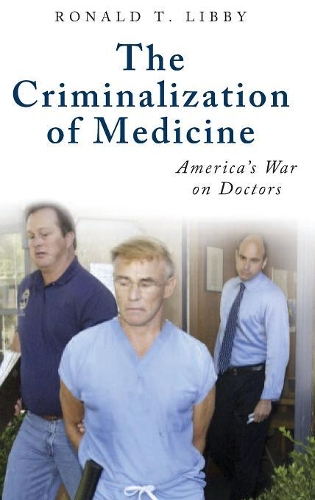
The Criminalization of Medicine: America's War on Doctors
(Hardback)
Publishing Details
The Criminalization of Medicine: America's War on Doctors
By (Author) Ronald T. Libby
Bloomsbury Publishing PLC
Praeger Publishers Inc
30th November 2007
United States
Classifications
Professional and Scholarly
Non Fiction
362.172
Physical Properties
Hardback
224
Width 156mm, Height 235mm
482g
Description
Medical doctors have been made political scapegoats for the financial crisis of healthcare and the failed war on drugs in the United States, says author Ronald Libby. In order to combat health fraud and abuse, the government launched tough new laws and guidelines designed to battle rising urban violent crimes, illegal drugs, and terrorism. But, by eliminating safeguards to protect the innocent, those same laws and guidelines also made it far easier for agents and prosecutors to arrest, charge, fine, convict, and imprison physicians. Current witch hunts for doctors now include wiretaps and whistleblowers who get 35 percent of the fines, even before conviction. Under a new doctrine of harmless error a doctor receives no protection against false testimony, Libby explains all of this, offering cases from media reports, personal interviews, and records of trial as examples in this compelling book. Huge law enforcement bureaucracies have been created to target doctors for alleged fraud, kickbacks, and drug diversion. Federal, state, and local police are rewarded for prosecuting doctors and other healthcare professionals, while investigators and prosecutors receive pay raises and promotions, and law enforcement agencies seize the assets of doctors charged with felonies. Libby explains that doctors are prosecuted for billing mistakes, for referring patients to clinics, or treating pain patients with pain-relieving drugs. They receive large fines and long prison sentences, some even harsher than those given common criminals who've committed the most violent offenses. Join Senior Research Fellow Libby, who is also a Professor of Political Science, as he shows us why doctors have been demonized as corrupt and greedy entrepreneurs, how media sensationalizes doctors' arrests, and what unjust prosecution could mean for the future of healthcare.
Reviews
Wars result in damage--some of which is intended and some of which is collateral. The Criminalization of Medicine is about some of the collateral damage of our nation's long-running wars on drugs (specifically, prescription drug diversions/misuse) and on health care fraud. In ten short chapters, Libby presents in-depth studies of the impact of these wars on the physicians who are the target of investigation, civil litigation (using the False Claims Act and civil forfeiture laws), and criminal prosecution. Most cases are settled or plea-bargained, so it is often difficult for outsiders for find out what actually happened. Libby has exhaustively researched his subject and uses court transcripts and filings, government testimony, media accounts, and in-person interviews to paint a rich picture of each case. * Health Affairs *
A worthwhile book by an author who carries appropriate crendentials. * MedicoLegal Consultants *
Libby documents egregious abuse of power: suborned perjury, intimidation, deprivation of due process, malicious misinterpretation of the regulations, character assassination, vicious mistreatment of inmates in a psychiatric prison/hospital.Libby's book could be a powerful tool in persuading the medical profession to take needed action. Buy several copies. * Journal of American Physicians and Surgeons *
Painstakingly researched and grippingly conveyed, Professor Libby quickly lays to rest any conception that this is one more conspiracy theory. He captures our curiosity and compels our belief that, while most doctors may not personally feel the pains of unjust persecution, there are many of us who have experienced these firsthand, or once removed. * Ethics & Medicine, An International Journal of Bioethics *
Author Bio
RONALD T. LIBBY is Professor of Political Science and Senior Research Fellow at the Blue Cross and Blue Shield Florida Center for Ethics, Public Policy and the Professions at the University of North Florida. He is the author of five books and many articles including a widely discussed policy paper, Treating Doctors as Drug Dealers, published by the Cato Institute.
